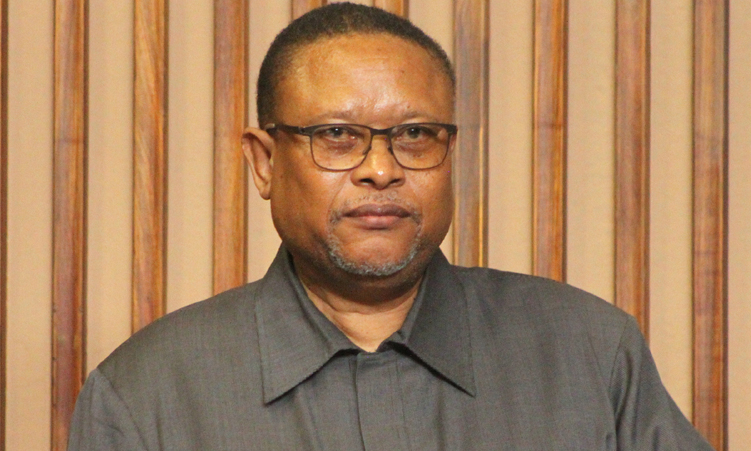Former fisheries and marine resources minister Bernhard Esau says it would be improper for a political party without fishing rights in Namibia to be allocated a fishing quota or to receive benefits from a quota.
Esau said this when he continued to testify in support of his application to be granted bail in the Windhoek High Court on Wednesday.
Questioned by deputy prosecutor general Cliff Lutibezi, Esau said it would have been “unfair, unreasonable and unjust” for him as minister of fisheries and marine resources to allocate fishing quotas to a political party.
Esau stated: “Political parties without any [fishing] rights are not entitled to governmental objective quotas, in a multiparty democracy.”
As Lutibezi continued with his cross-examination, he led Esau to documents about the use of quotas for “governmental objectives” by the state-owned National Fishing Corporation of Namibia (Fishcor). Esau signed the two documents, in which an auditing firm recorded Fishcor’s use of quotas allocated to other recipients, in February 2017 and February 2018.
In the auditing firm’s first report to Esau, it was recorded that during 2015/16 Fishcor paid an amount of N$15 million raised from horse mackerel quotas allocated for “governmental objectives” to the law firm Sisa Namandje & Co.
In the second report, on quotas given to Fishcor for third parties and for “governmental objectives” during 2016/17, it was recorded that horse mackerel quotas totalling 18 800 tonnes had been allocated to Swapo.
It was also recorded that those quotas, classified as having been for governmental objectives, were sold to the entity Karee Investments, which made payments for the quotas directly to Swapo.
Esau said during his tenure as minister of fisheries and marine resources – which ended with his resignation shortly before he was arrested near the end of November 2019 in connection with the Fishrot fishing quotas fraud and corruption case – he never received recommendations from the office of the fisheries ministry’s permanent secretary or executive director for quotas for governmental objectives to be awarded to political parties.
He said as minister he “signed off” recommendations on the allocation of quotas received from the office of the fisheries ministry’s permanent secretary or executive director. He did not decide to whom quotas were to be awarded, he said.
Esau also told the court that the N$15 million that Fishcor paid into a trust account of Sisa Namandje & Co had nothing to do with governmental objectives.
The state is alleging that close to N$82 million that Fishcor and Icelandic-owned fishing companies that used fishing quotas allocated to Fishcor paid into a bank account of the law firm De Klerk, Horn and Coetzee Incorporated, and also N$15 million that Fishcor paid into an account of Sisa Namandje & Co, were channelled to some of the accused in the Fishrot case and corporate entities controlled by them.
In its indictment in the Fishrot case now pending in the High Court, the state is also alleging that the N$15 million that Fishcor paid into a trust account of Sisa Namandje & Co was used “to pay personal loans and served as donations”.
The Bank of Namibia’s Financial Intelligence Centre has recorded in a report that after Fishcor paid the N$15 million to the law firm in December 2015, a transfer of N$7,6 million was made to an account of businessman Vaino Nghipondoka’s close corporation Babyface Investments CC.
It also reported that N$3 million was transferred from the law firm’s trust account to an account of Armas Amukwiyu, Swapo’s regional coordinator in Oshikoto, in December 2015, while N$5,2 million was paid from the trust account to the Gwashihwemwa Family Trust, of which Amukwiyu is a trustee, in the same month.
Asked by Lutibezi whether he would agree that the payments made by Fishcor to the two law firms were unlawful, Esau responded: “For sure, in terms of what transpired it was unlawful, it was unreasonable and it was unfair.”
He disputed testimony given by former Fishcor chief executive Mike Nghipunya, who is also charged in the Fishrot case and who has told the court that Esau gave instructions that money transferred to the two law firms was to be used for a Swapo congress.
“Devoid of any truth,” Esau said about Nghipunya’s testimony.
During his time as fisheries minister the only governmental objectives for which quotas could be allocated that he knew of were the Namibia Fish Consumption Promotion Trust and for drought relief, he said.
The bail hearing before judge David Munsu is scheduled to continue from 22 May.
Stay informed with The Namibian – your source for credible journalism. Get in-depth reporting and opinions for
only N$85 a month. Invest in journalism, invest in democracy –
Subscribe Now!







